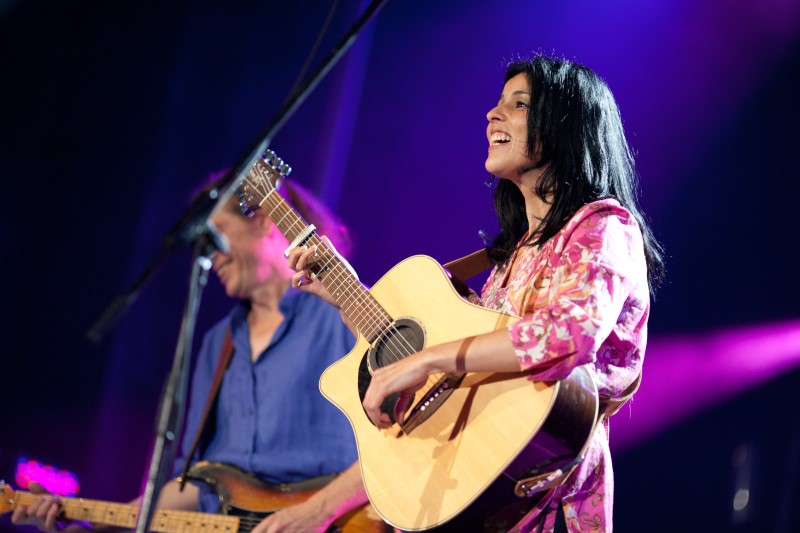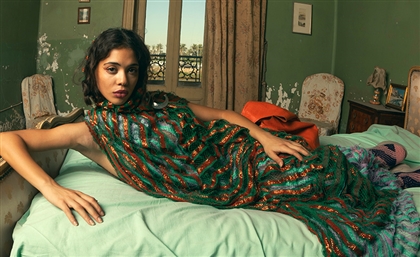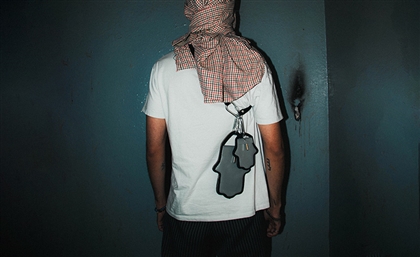The Musical Pulse of Algeria
Ahmed Yehia dissects the rich interplay between political, social and cultural elements that make up the diverse musical landscape of Algeria, from the historically charged raї music to the traditional chaâbi and the more contemporary fusion artists.

Facing the Mediterranean while gazing at the desert sand, Algeria is a geographically unparalleled country that was once the abode of Jews, Spaniards, Frenchmen, Arabs and Berbers. This rich ethnic diversity made Algeria a massive grotto that hides inside an astounding number of brilliant talents who embroider their nation's vivid musical scene with bewitching creativity.
Raї – Banned But Unstoppable
One cannot enter the orchard of raї without grasping its captivating story.
Raї is the musical offspring of the coastal city of Oran. Its heterogeneous community has nourished it with a wide assortment of musical influences; the melodies of flamenco, cha-cha and cabaret have been interlaced with the indigenous Bedouin grooves, while traditional gasba flutes, ghaita mizmars and guellal drums have played in a perfect harmony with modern occidental instruments, giving raї its complex musical expressions.
Literally translating to opinion, raї is expressive by nature; carrying beneath its folds the pains of poverty and the troubles of colonisation. It is the solace of the abused and the escape of the downtrodden from the cruelty of reality. It is the voice of the rebellious youth who chafed against traditions. Like blues and punk, raї has always been acerbically criticised for its controversially blunt lyrical content.
With the skyrocketing advancement of recording technology and the elevated cassette sales, the '80s was the period when the popularity of raї reached its peak. Raї became the mainstay of Algeria’s nightlife, and hence mixed-gender dancing in discotheques. This spearheaded calls for religious tolerance; according to Islamic fundamentalists, raї didn't only contradict conservative values but also extraneously spread a decadent Westernised culture. Consequently, attempts were made stifle raї by banning importation of blank cassette tapes and confiscating artists' passports, but all were in vain. Raї's popularity reached surreal heights through selling and exchanging tapes illicitly.
The '90s witnessed Algeria's black decade of terrorism; a civilian death toll that exceeded 50,000 and an economy in disarray were its highlights. The country was scourged with an extremist government that was infamously intolerant to criticism. With musicians, journalists and writers being murdered at a chilling regularity, intellectual freedom was gradually suffocating. The orchestrated campaign to smother raї started with the abduction of Cheb Hasni, simply for allowing girls to kiss him during a concert! They did not wait for more than a year to assassinate Rachid Baba-Ahmed, the producer who introduced raї to the most advanced recording devices at that time.

The escalating tension of the Islamist anti-raї campaign forced many musicians to pursue an escape to France an inevitable option. Exiled raї musicians found looming opportunities to plant a new fan base away from oppression and civil war. Surprisingly, raї experienced a period of great vitality; the music spread rapidly amid the Maghrebi-Arab community, and even Europeans who sympathized with their cultural strife and struggle against racism.
The Masters of Raї
Cheb Khaled

Khaled, who aptly sits on the throne of raї, was the first to go beyond local confines and deliver his music to international ears. His musical breakthrough was made with his sensational single "Didi" (Take, Take), which climbed to the summit of European music charts. He fostered his inaugural success with his albums "Sahra" (Desert), which featured his monster hit "Aїcha", and "N'ssi N'ssi" (Forget, Forget). His latest musical extravaganza "C'est La Vie" evoked the glories of raї; it was injected with a diversified instrumental palette and a message of coexistence and peace.
Rachid Taha

With his buzz-saw voice, scruffy bohemian-look and cheerful street persona, the sonically adventurous Rachid Taha has established himself as a rare phenomenon in Algeria's musical scene. His dizzying vocal facility, which transcends any style, has enabled him to cover the acknowledged classics of the east and the west; starting from Farid Atrash's "Hebina" (Love Us), to Abdel Halim's "Gana el-hawa" to The Clash's "Rock the Casbah" and Elvis Presley's "Now or Never". Taha has stolen hearts with his own subgenre of raї-rock, which he embellished with the irresistible strums of mandolute (ten-string oud with guitar frets).
Faudel

The little prince of raї, Faudel rose meteorically to fame as soon as he released his debut album "Baida" (White), which was a seductive mixture of raї, blues, funk and salsa. He was joined by Khaled and Rachid Taha in an earth-shattering live album called "1, 2, 3 Soleils" (1, 2, 3 Suns). It included tracks like "Khallouni Khallouni" (Let Me, Let Me), an impressive instrumental piece played by The Egyptian Orchestra, which paved the way for "Daiman" (Always), the Arabic adaptation of Frank Sinatra's "My Way," "Abdelkader" and "Tellement je t'aime" (So I Love You), as well as 20 other masterpieces.
Cheb Mami

A talent that blossomed in the land of exile, Mami is a relentless talent, blessed with a thumping voice that warbles in a playful Andalusian accent. His music is a bewitching amalgamation of awe-inspiring ingredients from the Turkish, Greek and Latin musical cuisines. Mami has carved his name in the raї folklore with a number of authentic raї songs, as well as fruitful collaborations with a bunch of Europe's most resonant names; Sting, Enrico Macias and Zucchero for example.
Chaâbi – Traditional, Conservative and Sentimental
Opposite to raï, Algerian chaâbi is part and parcel of the nation’s deeply conservative tradition. It was formalized during the 1930s in the Casbah of Algiers by its grand master Mhamed El-Anka. A chaâbi song is made up of guttural vocals set against an orchestral backdrop of pianos, flutes, percussions, violins and banjos. Lyrical themes of chaâbi resemble flamenco as they oscillate between love and loss, friendship and betrayal, to carry strong moral messages. The compositions of chaâbi went through a modernization process by the innovative El-Hachemi Guerouabi, whose aim was to magnetize younger audiences to such a popular style of songs. Dahmane El-Harrachi's profound classics like "Ya Rayah" (O' Emigrant!) and "Ach Edani" (Shouldn't Have Fallen for You) penetrated the emotional skin of his fans and made him a pioneering name of chaâbi. Following in his footsteps, his son Kamel is facing an arduous mission to revive such an emblematic musical style in a contemporary style.
Fusion – Music Without Borders
The Algerian Diaspora has spawned many musicians who integrated their local musical traditions with popular Western styles to create their signature genres.
Lili Boniche

Lili Boniche’s passion and innate sense of rhythm made him a pillar of Franco-Arab music. His rich musical repertoire is a pleasant melange of tango, paso-double and mambo. Throughout his career, he made snarling covers of great Cuban and European tunes, but with Arabic lyrics written by him. His cover of Dalida’s "Bambino" (Child) and "Ana Fil Hob," the Arabic adaptation of the Latin classic "Historia de un Amor" (A Love Story), are the staples of any oriental chill-out playlist.
Souad Massi

Souad Massi is a multilingual crooner and an elusive guitarist who began her career as the lead vocalist of the political rock band "Atakor." As the band’s popularity started to grow, she became targeted. So as to escape from death threats, she disguised herself by cutting her hair and dressing in male clothing and immediately fled to France. There, her energy exploded extraordinarily and her career blossomed as her album "Mesk Elil" won the world music award in 2006. Listening to her music is never a disappointment, because each song guarantees a splendidly eclectic mélange of rock, country, fado with some snatches of chaâbi and raï.
Labess

Labess (It’s Okay) is a Quebec-based group formed by the Algerian musician Nedjim Bouizzoul. Bouizzoul created a fresh "chaâbi-groove" style by meshing the hypnotic sounds of gnawa and the traditional tunes of chaâbi with the vibrant cadence of gipsy rumba. His voice is a blend of monstrous joy and trembling angst, distilled in a set of songs that narrate stories imbued with authenticity about the journey from the homeland to the land of welcome. Through his pure poetry that ricochets between Arabic and French, he reflects on cultural diversity, whilst staying away from the themes of conflict. Tickle your ears and pamper your mood with some of their works: "Dans Mon Desert" (In My Desert) and "Au Bord de L'eau" (On the Beach).
If our north African neighbors had something to brag about, it would definitely be their supernatural ability to produce rattling music.
- Previous Article Kablao! People Power in Your Pocket
- Next Article Turkish Gay Wedding Couple Persecuted
























